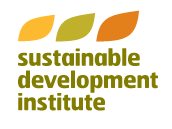Monrovia, Liberia (March 17, 2015)—A new report produced by the Sustainable Development Institute (SDI) has revealed that Liberia earns too little from its iron ore exports, which has severely strained state-citizen relations and relations between local communities and foreign multi-nationals operating in the mining sector.
Released today, the ground breaking report entitled Poverty in the Midst of Plenty: How Post-War Iron Ore Mining Is Failing to Meet Local People’s Expectations recommends important policy changes Liberia must adopt in order to address post-Ebola challenges in health, education and infrastructure. These include maximising Liberia’s income from the extraction of its iron ore, protecting the rights of Liberian workers in the mining sector, and distributing mining revenues equitably.
The report is based on interviews that SDI conducted over the course of one year in 2013-2014 with local communities directly impacted by mining contracts between the Government of Liberia and ArcelorMittal, China Union and Putu Iron Ore Mining, Liberia’s major investors in the sector. It reveals that Liberia gives overly generous tax breaks to iron ore investors, which grossly violates the country’s revised Revenue Code. For example, while the Revenue Code requires multinationals to pay 30 percent income taxes on all corporate profits, ArcelorMittal, China Union, and Putu only pay 25 percent.
A very timely publication, Poverty in the Midst of Plenty includes a compact menu of recommendations for the Government of Liberia, mining companies, and local and international NGOS to ensure Liberia accrues maximum benefits from its iron ore mining.
The SDI implores the Liberian government to demilitarize the mining sector; renegotiate mining agreements to ensure compliance with Liberia’s Revenue Code and other national legislation; investigate workers’ rights violations in the mining sector, particularly in the China Union concession area; conduct an independent assessment of revenues that should be generated from mining operations; and facilitate regular discussions between mining companies and local communities to improve relations.
“We only hear that China Union is paying money for community development, but we don’t know where the money goes,” said Hawa Kerkula, women’s leader of Yarbaryon Clan in Bong County, Liberia. She continued: “We who live near the mountain have not seen any benefit since China Union came here. Our roads are bad. There are no health facilities in our communities. How does the government expect us to live?”
According to SDI, mining companies must increase their impact by pressuring the Government of Liberia to properly invest the more than US$10 million they contribute annually for projects in communities that are directly impacted, while also regularly monitoring and auditing the funds; establishing outreach programs for local communities in the concession areas where company managers meet regularly with citizens’ groups; and expanding employment opportunities for Liberians by hiring permanent workers who can take advantage of employees’ benefits.
Equally important, the SDI insists that Liberian civil society and international NGOs serve as watchdogs in the mining sector by investigating and documenting human rights violations; working with local communities to air their grievances and seek redress; and advocating for concrete changes in policy and practice to improve governance in the mining sector.
“In the past, there was limited public awareness about the circumstances of communities impacted by post-war iron ore mining in Liberia. With this report, SDI shines the spotlight on the challenges they are facing, especially the frequent use of paramilitary units to disperse protests and the unhealthy relationships between mining companies and host communities,” said Nora Bowier, Coordinator of the SDI.
“The government and mining companies need to address these issues to safeguard the peace and for the sector to contribute to Liberia’s economic recovery – after Ebola,” she concluded.
The Sustainable Development Institute creates spaces for local communities in Liberia to participate in decision-making processes on natural resources.
Contact:
Silas Kpanan Ayoung Siakor
E-mail: ssiakor@sdiliberia.org
Phone: +231 (0) 880 655712/+231 (0) 770 001450
Website: www.sdiliberia.org
